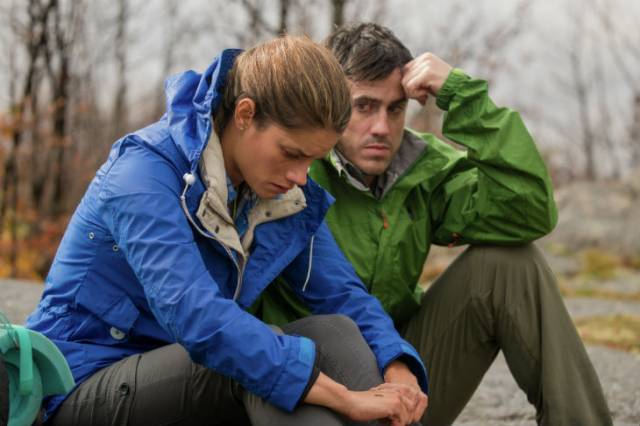

In theory, going camping in the wilderness ought be a pleasant and rewarding experience. There's a spiritual quality in nature that connects the modern camper to a time before Twitter and microwave ovens. Thoreau and countless others have spoken about exploring our relationship with the earth this way, and it continues to pull friends and families to go camping on their summer vacations. The key piece of information we often forget (and Backcountry reminds us of) is that in the wild, man's place at the top of the food chain is very much threatened.
Adam MacDonald's first foray as a writer/director takes us deep into the Canadian wilderness with Jenn and Alex – a young couple eager to take a romantic hike together. Alex (Jeff Roop), a dorkish but lovable type, is bent on taking his girlfriend to his favorite childhood hiking spot. Jenn (Missy Peregrym) is both confident and pragmatic, perhaps in ways that Alex is not. Their relationship is endearing in a few humorously unexpected ways – which helps invoke our sense of pity and fear once it is revealed that they are being hunted by a menacing black bear.
MacDonald sense of direction is airtight. Observing Jenn and Alex from a distance by use of long shots instills a sense of fear. Conversely, tight, shaky, framing of incredibly vivid bear attacks (filmed with real bears) adds to the general anxious tone. Most notably, in a role that in the wrong hands could've killed the film, Miss Peregrym does a fine job conveying a wide spectrum of fear, from the tremblingly nervous to total frantic chaos.
Backcountry starts off very strong, but ultimately slides into a whole new kind of story in the third act twist that is separate from what began. Early on, it is clear that the central conflicts (both internal and external) are irrevocably bound. Jenn and Alex's relationship, while undoubtedly a loving one, is being tested. The opening scene shows Jenn jokingly reading off of a tabloid-y magazine "How To Know If He's A Keeper" quiz. Later on, Alex is threatened by a drifter's "bedroom eyes" for Jenn, which forces him to puff himself up in order to assert his dominance (the alpha-male courting of women is admittedly trite, but actually works with the return-to-nature aesthetic).
This is why the setup is so strong: what's at stake internally (Alex and Jenn's happiness and relationship) and what's at stake externally (their survival) can both be solved by the same act. The problem, then, is that only one of these problems is addressed – presumably in an effort to preserve the sanctity of the "based on real events." The story then shifts away from a story about saving their relationship, and slides into a gory mess of just trying to survive. When you look at impacting survivalist thrillers like Jaws or the smaller scale 127 Hours, both of these films never let go of what they're trying to say. Every scene of Jaws is propulsive with an awareness of how it will all end. Its setup shows a town that is ignorant of the awesome power of nature, and its conclusion meets that same ignorance with a resounding: "nature is never to be underestimated." 127 Hours unites the internal and external conflict too, with the physical act of being pinned down reflecting the character's inability to reach out to people he's left behind.
All in all, Backcountry remains a very fun and thrilling adventure. MacDonald's directorial strengths outshine the weaknesses of his script. It's a film that knows how to modulate suspense, how to shock, and how to scare. Ultimately, the film accomplishes what it sets out to do: It makes your skin crawl.